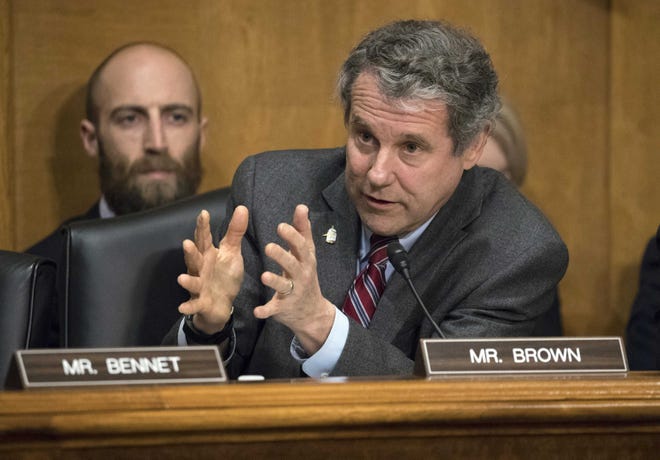
As millions of Ohio families get their first payments from the expanded child tax credit passed earlier this year, Democrats, including Ohio Sen. Sherrod Brown, are taking a victory lap.
The tax credit – $3,600 for children younger than age 6 and $3,000 for those between 6 and 17 – is estimated to lift more than 4.1 million children out of poverty nationwide, including more 132,000 in Ohio.
Eligible families – 92% of Ohio children – will get up to $300 per younger child and up to $250 per child age 6 to 17 each month from now through the end of the year. The rest of the credit will be applied next year on 2021 tax returns.
The full amount is available to parents who are single and earn under $75,000 a year, married couples who file jointly and earn annual income of less than $150,000, and single "head of household" filers who make less than $112,500 a year. The benefit zeroes out at $240,000 for single filers and $440,000 for joint filers.
For Brown, a Cleveland Democrat, it's the culmination of years of work convincing lawmakers to shuttle cash to families raising children – including the poorest – as way to alleviate income inequality. And it likely wouldn't have happened if Democrats hadn't won control of the Senate or if Donald Trump had won a second term in office.
More:A new child tax credit starts July 15. Here's what parents need to know.
More:Child tax credit checks arrive soon. Will they do enough for Cincinnati's kids in poverty?
More:How will the child tax credit inside Biden's stimulus package affect rural Ohio?
The Child Tax Credit dates back to the 1990s and was in its early years embraced by Republicans as tax relief for middle- and upper-middle-income families. Republicans led the effort to expand the credit in the early 2000s and make it partially refundable, or given in cash to families that owe little or no tax.
But they've balked at a fully-refundable credit.
Connecticut Rep. Rosa DeLauro, a Democrat, introduced legislation to expand the credit in 2003 and in every session since. She was the lone voice on the subject for several years, until she was joined by five Democratic colleagues. She's referred to the group as "the CTC six." That includes Brown, who introduced a bill to expand the child tax credit and the earned income tax credit for low-wage workers in the Senate in 2013.
Brown said he took on the issue after hearing from companies seeking tax breaks while he was on the Senate Finance Committee.
"We all talk about how important families are and raising our children are the most important thing we can do but so many people can’t do it," Brown said in a recent interview. "It's such a challenge. Raising kids is work. We should reward families and give families a chance."
Brown reintroduced his legislation in 2015, 2017 and 2019 and teamed up with Sen. Elizabeth Warren, D-Massachusetts, on an additional tax credit for families with young children under age 5, delivered in periodic cash payments. There were small, but significant victories along the way, such as in 2014 when then-President Barack Obama threatened to veto a massive tax cut bill if it didn't also expand the child tax credit or earned income tax credit.
The child tax credit increased under President Donald Trump, doubling to $2,000 in the 2017 tax bill at the urging of Republican Sen. Marco Rubio of Florida. The cost of the change, which raised the level at which the credit phases out, raised the annual cost from $52 billion a year to $118 billion in 2018, according to the Congressional Research Service.
But Rubio doesn't support full refundability or turning the credit into a "child allowance."
"By next tax season, some households with no working adults will receive more than $10,000 in these payments," Rubio wrote in a recent opinion piece for Real Clear Politics. "No work required. Just free money on top of America’s existing safety net."
When Joe Biden was elected president, Democrats saw an opportunity in the American Rescue Plan Act, a $1.9 trillion COVID-19 stimulus and relief package. Brown said he called Biden before he took office and urged support for the enhanced tax credit. By then, the idea had taken root – 46 Senate Democrats had signed on to Brown's 2019 bill. He also called Treasury Secretary Janet Yellen to ask whether monthly payments could be sent, putting money directly in parents' pockets, an idea from his earlier bill.
Much of the attention at the time the ARPA bill passed was on the individual stimulus payments. But Brown thinks the expanded child tax credit will have greater impact, once people start seeing the money flow into their bank accounts. And, he said, Democrats won't shy away from taking credit for the policy.
Supporters and critics of the expansion agree on one thing: it will be hard to let it end. The expanded credit expires next year. Biden has proposed extending it through 2025, but the price tag could sink it. Making the credit permanent would cost $1.6 trillion over 10 years, the Tax Foundation estimated.
Brown said the cost is worth it. Parents can use the cash to send their kid to summer camp or to afford child care needed to pick up extra work.
"For families who are really struggling this makes all the different to the world."
Jackie Borchardt is the bureau chief for the USA TODAY Network Ohio Bureau, which serves the Columbus Dispatch, Cincinnati Enquirer, Akron Beacon Journal and 18 other affiliated news organizations across Ohio.
Source link








